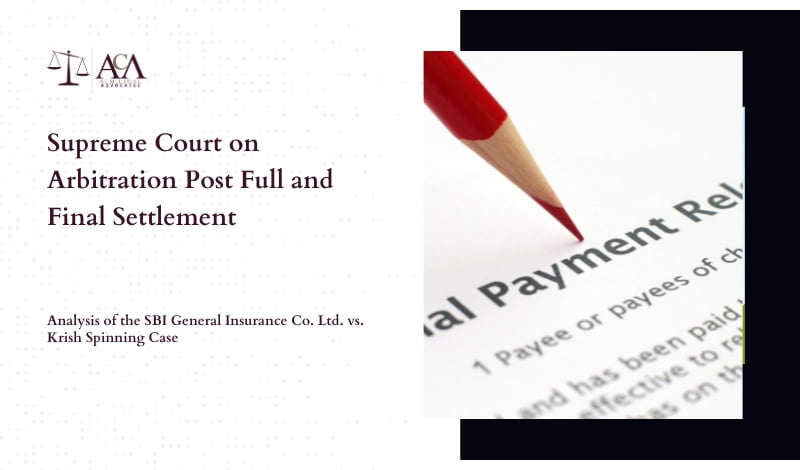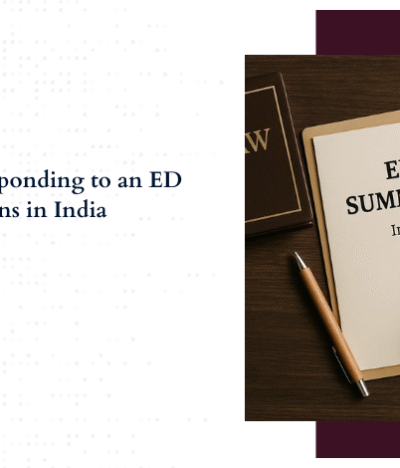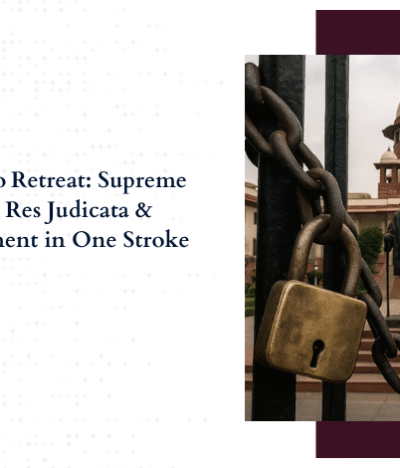Analysis of the SBI General Insurance Co. Ltd. vs. Krish Spinning Case
The recent Supreme Court of India judgement in the case of SBI General Insurance Co. Ltd. vs. Krish Spinning has significant implications for the interpretation of arbitration clauses post-full and final settlements. This case adjudicated on 18th July 2024, brings clarity to the conditions under which arbitration can be invoked despite the execution of a discharge voucher indicating full and final settlement.
Factual Matrix
The appellant, SBI General Insurance Co. Ltd., a private sector general insurance company, issued a standard fire and special perils insurance policy to the respondent, Krish Spinning, a partnership firm engaged in cotton spinning. The insurance policy covered the period from 31st March 2018 to 30th March 2019 for a sum of Rs 7,20,00,000/-.
During this period, two fire incidents occurred at the respondent’s factory, causing substantial losses. The first incident, on 28th May 2018, resulted in claimed losses of Rs 1,76,19,967/-. The second incident, on 17th November 2018, led to further claimed losses of Rs 6,32,25,967/-. This judgment specifically pertains to the dispute arising from the first fire incident.
Submissions on Behalf of the Appellant
Mr. Ketan Paul, the learned counsel for the appellant, argued that a full and final settlement had been reached between the parties. The respondent had accepted an assessed loss of Rs 84,19,579/- after the first fire incident and had signed a discharge voucher on 4th January 2019 confirming receipt of this amount in the full and final settlement.
The appellant contended that this discharge voucher barred any further claims or arbitration. Furthermore, the appellant argued that the respondent had not raised any allegations of coercion or undue influence until much later and that these allegations were an afterthought, lacking in credibility. The appellant also cited the Supreme Court decision in National Insurance Co. Ltd. v. Boghara Polyfab to support their stance that arbitration should be refused in cases of inordinate delay in raising disputes.
Submissions on Behalf of the Respondent
Ms. Savita Singh, the learned counsel for the respondent, argued that the discharge voucher was signed under economic duress. The respondent faced significant financial pressure due to the pending claims and loans from financial institutions. The respondent contended that the execution of the discharge voucher was not voluntary and was done under the apprehension that failing to do so would affect the pending claim from the second fire incident.
The respondent also stated that they had sent a protest letter on 25th October 2019, shortly after receiving the final payment for the second claim. This letter highlighted their dissatisfaction with the settlement amount and requested a copy of the survey report, which was provided only on 7th November 2019. Subsequently, the respondent issued a legal notice on 2nd March 2020 invoking arbitration, arguing that the settlement was coerced and not made with free consent.
Issues for Determination
The Supreme Court identified three key issues for determination:
- Whether the execution of a discharge voucher towards the full and final settlement between the parties would operate as a bar to invoke arbitration?
- What is the scope and standard of judicial scrutiny that an application under Section 11(6) of the Arbitration and Conciliation Act, 1996 can be subjected to when a plea of “accord and satisfaction” is taken by the defendant?
- What is the effect of the decision of the Court in In Re: Interplay Between Arbitration Agreements under the Arbitration and Conciliation Act 1966 and the Indian Stamp Act 1899 on the scope of powers of the referral court under Section 11 of the Act, 1996?
These issues were essential in determining the applicability of arbitration in cases where a discharge voucher had been signed, purporting to be a full and final settlement of claims.
Analysis by the Court
Justice J.B. Pardiwala delivered the judgement, dividing the analysis into several parts:
- Discharge Voucher and Arbitration: The Court held that the execution of a discharge voucher does not automatically bar arbitration. Justice Pardiwala referenced the National Insurance Co. Ltd. v. Boghara Polyfab case, stating that if the discharge voucher was obtained under coercion, fraud, or undue influence, it would not preclude arbitration. The arbitration clause in the insurance policy remains valid and enforceable unless expressly nullified by the parties.
- Scope and Standard of Judicial Scrutiny: The Court reiterated that under Section 11(6) of the Arbitration and Conciliation Act, 1996, the referral court’s role is limited to examining the existence of an arbitration agreement. Detailed scrutiny of whether the claims are arbitrable or if there was coercion in signing the discharge voucher should be left to the arbitral tribunal. The judgement emphasized minimal judicial interference, aligning with the principles established in Duro Felguera, S.A. v. Gangavaram Port Ltd.
- Impact of Previous Decisions: The judgement analyzed the impact of previous decisions, particularly the interplay between the Arbitration and Conciliation Act, 1996, and the Indian Stamp Act, 1899. The Court highlighted that arbitral autonomy and the doctrine of separability ensure that the arbitration agreement survives even if the substantive contract is terminated or fulfilled.
Conclusion
The Supreme Court concluded that the arbitration clause in the insurance policy between SBI General Insurance Co. Ltd. and Krish Spinning remains valid despite the execution of a discharge voucher. The Court held that:
- The discharge voucher signed by Krish Spinning did not bar them from invoking arbitration, especially since they alleged coercion and undue influence in its execution.
- The referral court’s scrutiny under Section 11(6) of the Arbitration and Conciliation Act, 1996, should be limited to the existence of an arbitration agreement. The detailed examination of whether the discharge voucher was signed under coercion is a matter for the arbitral tribunal.
- The arbitration agreement survives the full and final settlement of the substantive contract, ensuring that disputes arising from or related to the contract can be resolved through arbitration.
This judgement reinforces the principle of minimal judicial intervention in arbitration matters and upholds the autonomy of arbitral tribunals in adjudicating disputes related to the substantive contract.






